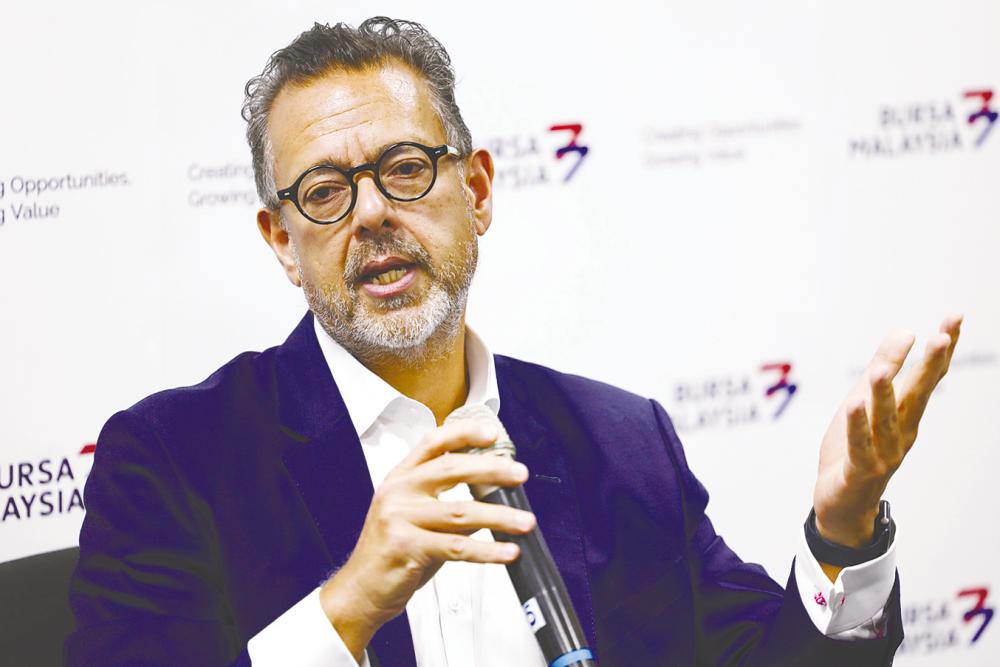PETALING JAYA: Bursa Malaysia Bhd anticipates an uptick in initial public offerings (IPO) this year, particularly on the ACE Market, with several pending listing after receiving approval.
Looking ahead, CEO Datuk Muhamad Umar Swift said the IPO pipeline this year remains healthy.
Furthermore, he pointed out, Securities Commission Malaysia’s recent introduction of an accelerated transfer process from the ACE Market to the Main Market this year is expected to strengthen its position and offer opportunities to issuers and investors alike.
Despite challenges, Muhamad Umar said, the domestic IPO market showed resilience in 2023, with total IPO funds raised and market capitalisation surpassing that in the year before.
Last year, the exchange registered 32 IPO against an initial target of 39 IPO. Despite that, it raised RM3.58 billion compared with RM3.49 billion from 35 IPO recorded in 2022, bringing its IPO market capitalisation to RM13.63 billion compared with RM11.15 billion in the year prior.
ACE Market listings totalled 24, making up the bulk of IPO in 2023 compared with seven on the Main Market and only one on the LEAP Market. The listing of Jati Tinggi Group Bhd marked the final listing of the year.
“The decrease in IPO in 2023 was primarily due to fewer listings on the LEAP Market, as companies assessed the LEAP Transfer Framework before making a decision on their listing strategy.
“While we have observed a slight decline in listings, it is important to recognise that market dynamics can fluctuate. Factors such as economic conditions, investor sentiment and external events may impact listing decisions in any given year,” Muhamad Umar told SunBiz.
In 2022, IPO activity surged with a total of 35 IPO, comprising five, 25 and five on the Main, ACE and LEAP markets respectively.
In terms of listing process duration, Muhamad Umar said it varies from company to company as it is dependent on factors such as the complexity of the company’s structure and the specifics of the listing scheme.
Generally, the process takes between four and 12 months, which will include the engagement of various advisers, due diligence and verifications to be undertaken by these advisers, regulatory process as well as post-approval requirements.
“This timeline can be affected by the company’s adherence to the jurisdiction’s accounting principles, disclosure requirements and regulatory rules, as non-compliance may lead to delays. After receiving approval, companies are given six months to complete their IPO exercise,” said Muhamad Umar.
Moving forward, he said the exchange is actively exploring various technological solutions to enhance its operations and is committed to exploring how these advancements can be utilised effectively and responsibly in its listing processes.
“While we are taking a thoughtful approach to this, some aspects of technology must be taken into consideration to meet the standards of our operational excellence and market integrity,” he added.
Muhamad Umar said that while it continued to see diversity in terms of sectors or types of businesses across the three markets, there were discernibly more companies in consumer products and services, industrial products and services as well as technology listed during 2023.
Touching on growth sectors, he noted that there has been ongoing dialogue between various participants within the capital market, market intermediaries and government authorities to make Malaysia a more attractive listing destination for technology-related industries, halal, healthcare and companies focusing on environmental, social and governance (ESG) principles.
“The emphasis on these sectors is driven by their potential for growth and innovation, aligning with global market trends and Malaysia’s economic strengths. These sectors are seen as pivotal for the country’s future economic development, hence the specific focus to make Malaysia an attractive listing destination for companies in these areas,” he added.
On challenges faced in 2023, Muhamad Umar pointed out that as Malaysia is a highly open economy, its equity market is not spared impacts from global headwinds – such as tightening of monetary policy, geopolitical uncertainties and slower growth – which have been known to create short-term market volatility.
Despite the challenging operating environment, the exchange kept its focus and stayed true to its purpose as a trusted and reliable platform for fundraising, investment and risk management, while meeting the evolving needs of stakeholders.
Muhamad Umar said the key focus areas last year involved broadening its core, which included IPO as well as new product offerings, improving ESG practices and competitiveness, driving market conversations and fortifying marketing efforts to attract foreign investors as well as introducing and enhancing supportive frameworks to boost market vibrancy and trading.
In addition, the exchange concentrated on improving profiling and visibility of public listed companies (PLC) via Bursa Research Incentive Scheme, Investor Relations and Public Relations Programme, Bursa Digital Research as well as strengthening participation in the PLC Transformation Programme.
“Another key priority for us is to continuously foster and protect investors' trust in our marketplace, including through timely disclosure of quality information and investor education. Well-informed investors are less likely to behave irrationally in the event of unforeseen circumstances or heightened uncertainties,” Muhamad Umar remarked.









